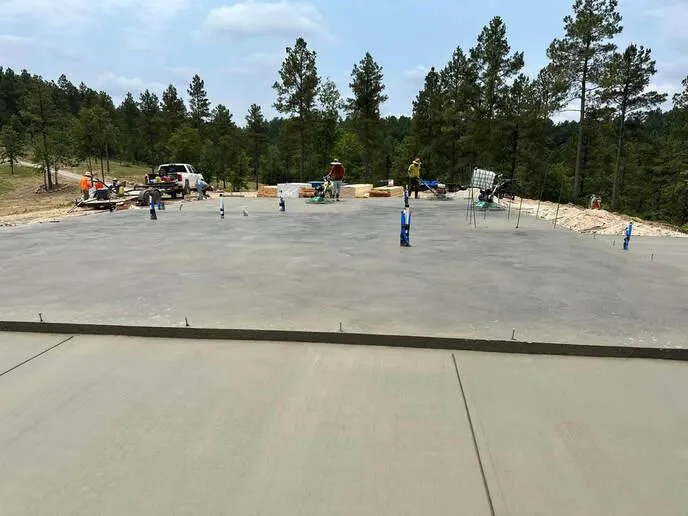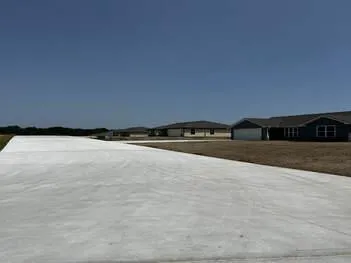Concrete Foundations in Hendersonville, NC

Concrete foundations are the backbone of any sturdy and reliable structure in Hendersonville, North Carolina. Whether it's a residential home, commercial building, or infrastructure project, concrete foundations provide the essential support needed to ensure the stability and longevity of the construction.
With Hendersonville's varying soil conditions and climate, concrete foundations offer unparalleled strength and durability, making them the preferred choice for builders and engineers.
A properly designed and constructed concrete foundation can withstand the test of time, enduring the region's weather fluctuations, including heavy rains and occasional snowfall. Its ability to resist moisture and ground movement ensures that the structure remains structurally sound, preventing potential foundation settlement or cracks that could compromise the integrity of the building.
In addition to its strength, concrete foundations offer versatility in design and can be tailored to the specific requirements of the project. From simple and straightforward foundations for residential homes to more complex and reinforced designs for large-scale structures, concrete foundations provide a reliable solution for a wide range of construction needs.
Call Today! 828-414-4259
Types of Concrete Foundations
Concrete foundations come in various types, each designed to suit different building needs and soil conditions. The type of concrete foundation chosen for a construction project depends on factors like the structure's size, load-bearing requirements, local building codes, and the soil composition. Here are some common types of concrete foundations:
Slab-on-Grade Foundation: Slab-on-grade foundations are one of the simplest and most cost-effective types. This type involves pouring a single, thick slab of concrete directly onto the ground. Slab foundations are commonly used for residential homes and smaller structures. They are ideal for areas with stable soil and minimal frost depth.
Crawl Space Foundation: A crawl space foundation includes a raised concrete floor supported by short foundation walls, creating a space between the ground and the bottom of the structure. This type allows for easy access to utilities and provides additional protection from moisture and pests. Crawl space foundations are commonly used in areas with clayey soils or in regions prone to termite infestations.
Full Basement Foundation: Full basement foundations involve pouring concrete walls and a floor to create a fully enclosed underground space beneath the entire building. Basements provide additional living or storage space and offer protection during severe weather events. Full basement foundations are commonly used for larger residential and commercial buildings.
Pier Foundation: A pier foundation consists of individual concrete piers or columns that support the structure above the ground. These piers are spaced strategically to distribute the building's weight evenly. Pier foundations are suitable for areas with expansive soils or areas with high water tables.
Mat Foundation (Raft Foundation): A mat foundation is a large, thick concrete slab that covers the entire building area. It spreads the building's load evenly over a larger area and is commonly used for high-rise buildings and structures with heavy loads.
Frost-Protected Shallow Foundation: This type of foundation includes insulation around the exterior of the concrete slab or perimeter walls to protect against frost heave. Frost-protected shallow foundations are used in regions with colder climates and shallow frost depths.
T-shaped Foundation: A T-shaped foundation includes a footing below the frost line and a stem wall that rises above ground level. This type is commonly used for residential homes in regions with colder climates.
Advantages of Having Concrete Foundation

Concrete foundations offer a host of advantages that make them the preferred choice for supporting various structures, from residential homes to commercial buildings and infrastructure projects. Here are the key advantages of having a concrete foundation:
Strength and Durability:
Concrete is a robust and durable material that can withstand heavy loads, weather fluctuations, and other environmental factors. A properly constructed concrete foundation provides a solid and stable base for the structure it supports, ensuring its longevity and structural integrity.
Stability and Safety:
Concrete foundations offer excellent stability and safety for buildings. Their strength and resistance to ground movement reduce the risk of settlement or shifting, minimizing the chances of structural damage. This stability is especially important in areas prone to earthquakes or expansive soils.
Protection from Moisture and Pests:
Concrete foundations create a barrier between the structure and the ground, protecting it from moisture and pests. This helps prevent issues such as mold growth, rot, and termite infestations, contributing to a healthier indoor environment.
Insulation and Energy Efficiency:
Certain types of concrete foundations, like insulated concrete forms (ICFs) and frost-protected shallow foundations, provide enhanced insulation, improving energy efficiency and reducing heating and cooling costs for the building.
Design Flexibility:
Concrete foundations offer design flexibility, allowing for various types of foundations to suit different building needs and site conditions. From simple slab-on-grade foundations to complex full basements, concrete can be adapted to accommodate diverse architectural designs.
Eco-Friendly Option:
Concrete is a sustainable and eco-friendly building material. It is made from natural resources like limestone, water, and aggregates. Additionally, concrete foundations can be recycled or reused when structures reach the end of their life cycle, reducing waste.
Fire Resistance:
Concrete is highly fire-resistant, providing an added layer of protection to the building and its occupants. A concrete foundation can help contain fires and limit their spread, enhancing overall safety.
Cost-Effectiveness:
Concrete foundations are cost-effective in the long run due to their durability and low maintenance requirements. While the initial construction cost may be higher than other materials, the long-lasting performance of concrete foundations makes them a cost-efficient investment.
Sound Insulation:
Concrete foundations offer sound insulation, reducing the transmission of noise from outside the building to the interior spaces. This can be particularly beneficial in urban areas or buildings where noise control is essential.
Concrete foundations provide numerous advantages, including strength, durability, stability, protection from moisture and pests, energy efficiency, design flexibility, eco-friendliness, fire resistance, cost-effectiveness, and sound insulation. These benefits make concrete foundations an excellent choice for ensuring the stability, safety, and longevity of buildings, making them a fundamental component of construction in various applications.
Lay a solid foundation for your dream home in Hendersonville, NC
How long does it take for a concrete foundation to cure?
The curing time for a concrete foundation can vary depending on various factors such as the type of concrete used, weather conditions, and the size and thickness of the foundation. In general, concrete reaches its maximum strength after about 28 days of curing. However, it is essential to note that concrete gains significant strength within the first few days of pouring. Contractors may advise waiting at least 7 days before removing forms or applying significant loads to the foundation.
Proper curing is crucial for ensuring the foundation's long-term durability and performance.
Can a concrete foundation crack, and how can it be prevented?
Concrete foundations can develop cracks over time due to various factors, including shrinkage during curing, settling of the soil, and external forces such as temperature changes or ground movement.
While small, hairline cracks are relatively common and typically do not pose significant structural issues, larger cracks may warrant attention.
To prevent excessive cracking, it is essential to use proper concrete mixes, ensure proper compaction of the soil before pouring, and provide adequate control joints to allow for controlled cracking.
A Hendersonville Concrete Solutions, where we extend our expertise to offer exceptional Concrete Driveways services as well. Just as we prioritize the strength and stability of your building structures with our Concrete Foundations, we bring the same dedication to excellence to our Concrete Driveways. A well-constructed concrete driveway is more than just a pathway; it is the first impression of your property, welcoming guests and residents with elegance and functionality.
Our skilled team specializes in designing and installing durable and visually appealing concrete driveways that can withstand the test of time and various weather conditions. With meticulous planning and expert craftsmanship, we ensure that your Concrete Driveway complements the architectural style of your property while providing a smooth and reliable surface for everyday use.
Whether it's for residential or commercial spaces, trust Hendersonville Concrete Solutions to deliver Concrete Driveways that elevate the overall aesthetics and value of your property. Experience the seamless connection between our reliable Concrete Foundations and beautifully crafted Concrete Driveways, creating a strong and visually appealing foundation for your property's future.
Get a free quote
Fill out the form below to request a free consultation
Hendersonville, NC
hendersonvilleconcretecontractor.com
Mon-Sat: 7am - 7pm
© Copyright 2024 Hendersonville Concrete Solutions. All Rights Reserved.





